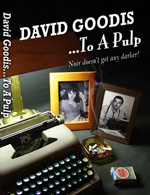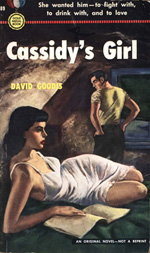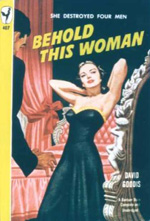- Welcome
- Noir Zine
- Allan Guthrie
- Books
"...those who enjoy the darker side of the genre are in for some serious thrills with this..."
Laura Wilson, The Guardian

Published in the UK by Polygon (March 19th, '09) and in the US by Houghton Mifflin Harcourt (Nov '09).
DAVID GOODIS ... TO A PULP
Brian Greene talks to Larry Withers about his new documentary on one of the greats of noir fiction.
 David Goodis’s personal life story is sheer noir, as grittily desperate as the tragic, hardboiled novels penned by the “poet of the losers.” Much of his tale is already well known to anyone who’s read up on him: his rise to success as a novelist and screenwriter when his pulp classic Dark Passage was made into a Hollywood film, and when Goodis was subsequently hired on as a well-paid Warner’s scriptwriter; his return to his parents’ home in Philadelphia after a handful or so of unhappy years in Hollywood; the picture of him living out his last years haunting the seediest corners of Philly, then holing up in his childhood bedroom and pumping out classics like Down There (famously and brilliantly adapted for the Truffaut film Shoot the Piano Player), The Blonde on the Street Corner, Of Tender Sin, etc.
David Goodis’s personal life story is sheer noir, as grittily desperate as the tragic, hardboiled novels penned by the “poet of the losers.” Much of his tale is already well known to anyone who’s read up on him: his rise to success as a novelist and screenwriter when his pulp classic Dark Passage was made into a Hollywood film, and when Goodis was subsequently hired on as a well-paid Warner’s scriptwriter; his return to his parents’ home in Philadelphia after a handful or so of unhappy years in Hollywood; the picture of him living out his last years haunting the seediest corners of Philly, then holing up in his childhood bedroom and pumping out classics like Down There (famously and brilliantly adapted for the Truffaut film Shoot the Piano Player), The Blonde on the Street Corner, Of Tender Sin, etc.
Other aspects of Goodis’s personal story that are not as well known, and some of which make his life seem all the more hopelessly coarse, are explored in a new documentary, David Goodis . . . To a Pulp. The film features interviews with Goodis’s close friends, family members, and various academics and noir specialists who have studied his story. The viewer learns about Goodis’s younger brother Herbie, who suffered from an undiagnosed mental illness and who leaned heavily on David. We hear some shy-making details about Goodis’s penchant for rough working girls who would abuse him in various ways per his requests and as a paid personal service. On the more positive side, Goodis’s contagious sense of humor is explored, as is his covert yet seemingly healthy affair with the African-American sculptor Selma Burke. And, most intriguing of all, we learn details about Goodis’s secret marriage to the mysterious Elaine Astor.
The documentary was made by Larry Withers, who happens to be Elaine’s son. When his mother died in 1986 Withers discovered among her effects papers relating to a marriage, and subsequent divorce, that no one in the family knew about. He came to realize that his mother’s partner in this clandestine marriage was a writer named David Goodis. Withers got intrigued and started learning about Goodis, and his thorough research into the author’s life story and writing record serves as the basis of the documentary.
 To lovers of Goodis’s novels, the most interesting connections the documentary offers between his life story and his writing are in the character of Elaine. In the film she is made out to be a haughty, demanding, sexually teasing woman who did great damage to Goodis’s psyche during their brief marriage. This image of her calls to mind so many of the hard women in Goodis’s novels - none more than Mildred, the stonehearted wife of the lead character in Cassidy’s Girl, who uses her husband’s physical yearning for her as a weapon to beat him down.
To lovers of Goodis’s novels, the most interesting connections the documentary offers between his life story and his writing are in the character of Elaine. In the film she is made out to be a haughty, demanding, sexually teasing woman who did great damage to Goodis’s psyche during their brief marriage. This image of her calls to mind so many of the hard women in Goodis’s novels - none more than Mildred, the stonehearted wife of the lead character in Cassidy’s Girl, who uses her husband’s physical yearning for her as a weapon to beat him down.
David Goodis ... To a Pulp is available on DVD now (you can order it direct from www.onairvideo.com), and will make its big screen debut in Philadelphia in early March. Amidst a quickly-mounting buzz swirling around the film among noir enthusiasts, Withers took time out to have the following e-mail exchange with me:
Noir Originals: For the record, can you just tell the story of how you came to learn about your mother’s marriage to David Goodis?
Larry Withers: When my mother died in 1986 we discovered the marriage certificate and divorce decree among her papers related to her marriage to David Goodis. There wasn’t much else to go on. It wasn’t until one of my sisters came across a copy of Difficult Lives, a small volume by James Sallis that we learned the real identity of Goodis and true nature of their relationship. It was shocking, to say the least.
NO: What was it about learning of the secret marriage that made you want to learn so much about Goodis’s life and work?
LW: It was a mystery story, and who doesn’t love a mystery? So many aspects to Goodis’ life, so many sides to his personality, so many contradictions…he’s a subject fertile for speculation.
NO: How exactly did you go about researching Goodis? How did you learn so much about him?
LW: Difficult Lives laid a good foundation for my research. Internet articles and blogs by Allan Guthrie and Jay Gertzman helped to give me a better literary perspective on Goodis. But I gleaned the greatest insight into the man and the writer through interviews with family, friends and Goodis experts, which I conducted for the documentary. Their passion and appreciation for Goodis is evident in the documentary and helped spur me on. And without question, Lou Boxer (who, in fact, is working on a biography of Goodis) was invaluable in terms of resources, advice, support and friendship.
NO: Were you a fan of noir fiction before becoming interested in Goodis’s novels? Whether you were or not, do you think you’ll continue to read other writers similar to Goodis?
LW: I’ve always been a fan of noir films and Dark Passage in particular. But learning about Goodis and reading his novels has wakened an interest in pulp fiction and I’m sure I’ll continue exploring this genre.
NO: What would you say all this research has taught you about your mother? In what ways do you see her differently now than how you viewed, and felt about, the woman you knew as your mother?
LW: My relationship with my mother was always conflicted. For the most part, I chalked it up to circumstances and poor interpersonal skills. But now, learning about this lie and the things I’ve heard about my mother, she’s more a mystery now than before.
NO: Having made this film, do you feel like you’re done researching Goodis’s life and work, or do you feel like there’s still some things you’d want to explore about him?
 LW: Goodis could be a great storyteller and I particularly enjoy the novels written while he worked in Hollywood. I’ve toyed with the idea of producing a Goodis novel. Behold This Woman would make a great, albeit disturbing film. Think Mommy Dearest meets The Black Widow.
LW: Goodis could be a great storyteller and I particularly enjoy the novels written while he worked in Hollywood. I’ve toyed with the idea of producing a Goodis novel. Behold This Woman would make a great, albeit disturbing film. Think Mommy Dearest meets The Black Widow.
NO: Would David Goodis recognize the Philadelphia he knew in the city as it is now?
LW: The areas and haunts of Goodis are gone today. With redevelopment they’ve been transformed from blight into tony. But Goodis was always interested in the dark cavities of the city and wherever they exist today, I’m sure he’d seek them out.
NO: Please tell me a little about On Air Video – what kinds of products the company makes in general.
LW: Our company reflects our varied interests. We produce instructional videos for the fine arts and the arts & crafts, and fitness videos. With David Goodis…To A Pulp, we’re now beginning to branch out into other areas such as documentaries.
# # #
Copyright© Brian Greene, 2010
 BRIAN GREENE’s
short stories, personal essays, and writings on books, music, and film have appeared in a variety of publications since 1991. He won a short fiction contest held by Jerry Jazz Musician in 2008. He writes regularly for Shindig!, a U.K.-based music magazine with worldwide distribution. Greene is at work on a biography of Ted Lewis, and has written articles on Lewis for Noir Originals, Crime Time, Paperback Parade, and Crimeculture. Greene lives in the Triangle area of North Carolina with his wife Abby, their daughter Violet, and two cats.
BRIAN GREENE’s
short stories, personal essays, and writings on books, music, and film have appeared in a variety of publications since 1991. He won a short fiction contest held by Jerry Jazz Musician in 2008. He writes regularly for Shindig!, a U.K.-based music magazine with worldwide distribution. Greene is at work on a biography of Ted Lewis, and has written articles on Lewis for Noir Originals, Crime Time, Paperback Parade, and Crimeculture. Greene lives in the Triangle area of North Carolina with his wife Abby, their daughter Violet, and two cats.
Contact Brian
